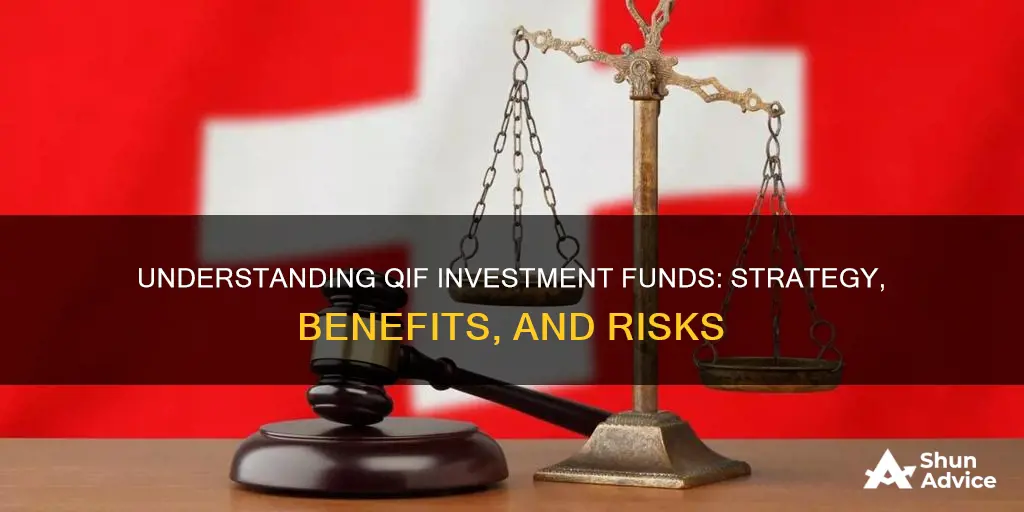
Qualifying Investor Funds (QIFs) are a type of investment fund that is regulated by the Central Bank of Ireland (CBI). They are the most flexible type of investment fund available in Ireland, offering minimal investment restrictions and exemption from borrowing limits. QIFs are often used to hold real estate assets, and they can be structured as companies, unit trusts, investment limited partnerships, or common contractual funds. In recent years, Ireland has also introduced Qualifying Investor Alternative Investment Funds (QIAIFs), which are tax-free structures for holding assets. These funds have gained popularity among international and Irish investors due to their flexibility and tax advantages.
| Characteristics | Values |
|---|---|
| Type of Fund | Investment fund |
| Regulator | Central Bank of Ireland (CBI) |
| Flexibility | Most flexible type of investment fund available in Ireland |
| Investment Restrictions | Minimal |
| Borrowing Limits | Exempt |
| Authorisation Process | Fast-track |
| Authorisation Time | One day |
| Structure | Company, unit trust, investment limited partnership or common contractual fund |
| Service Providers | Promoter, investment manager, custodian and administrator |
| Tax on Rental Income | Exempt |
| Gains on Disposal of Assets | Exempt |
| Property Assets Valuation | Twice yearly, plus upon initial acquisition |
What You'll Learn
- QIFs are regulated by the Central Bank of Ireland, but benefit from minimal investment restrictions
- QIFs are a popular vehicle for holding property assets
- QIFs are subject to a fast-track authorisation process
- QIFs can be structured as a company, unit trust, investment limited partnership or common contractual fund
- QIFs are a favoured vehicle for geared funds

QIFs are regulated by the Central Bank of Ireland, but benefit from minimal investment restrictions
Qualifying Investor Funds (QIFs) are a type of investment fund that is regulated by the Central Bank of Ireland (CBI). They are the most flexible type of investment fund available in Ireland, benefiting from minimal investment restrictions and an exemption from borrowing limits. QIFs are subject to a fast-track authorisation process with the CBI, allowing them to obtain authorisation within one day of application. This streamlined process is available provided that the QIF's service providers and directors have been previously approved by the CBI.
QIFs can be structured in various ways, including as a company, a unit trust, an investment limited partnership, or a common contractual fund. Establishing a QIF as a limited liability company can protect investors from the risk of personal unlimited liability when holding property assets. QIFs also offer tax advantages, such as exemption from Irish tax on rental income and gains from the disposal of assets. These features make QIFs attractive for investors and lending banks.
The CBI's oversight ensures that QIFs maintain certain standards. For example, the promoter firm must maintain a minimum capital level of €635,000 and be able to demonstrate this to the CBI. Additionally, QIFs require specific service providers, including a promoter, investment manager, custodian, and administrator. While the promoter and investment manager roles can be filled by a regulated investment management firm, the CBI will also consider appointing a non-regulated firm if it can demonstrate appropriate expertise.
The CBI's regulation of QIFs strikes a balance between providing flexibility and maintaining necessary oversight. While QIFs benefit from minimal investment restrictions, they are still subject to certain requirements and protections that safeguard investors and the broader economic landscape.
Invest Wisely: Franklin India Prima Plus Fund Guide
You may want to see also

QIFs are a popular vehicle for holding property assets
Qualifying Investor Funds (QIFs) have become an increasingly popular vehicle for holding property assets, especially in Ireland. This is true for both international and Irish investors. For international investors, the appeal of QIFs lies in the dramatic fall in property values in Ireland, while Irish investors benefit from the flexibility and minimal investment restrictions offered by QIFs.
QIFs are the most flexible type of investment fund available in Ireland, enjoying the benefits of regulated fund status while being exempt from borrowing limits. They are subject to a fast-track authorisation process with the Central Bank of Ireland (CBI), which can be obtained within one day if the QIF's service providers and directors have been previously approved.
One of the advantages of using a QIF to hold property assets is the avoidance of personal unlimited liability for investors. In addition, QIFs are not subject to Irish tax on rental income or gains from the disposal of assets, making them a popular vehicle for geared funds. The absence of Irish tax on rental income means that a greater proportion of this income can be used to service interest payments on the QIF's borrowings, making it an attractive proposition for both investors and lending banks.
The property assets of a QIF must be valued at least twice a year to determine their market value, in addition to being valued upon initial acquisition. This regular valuation process ensures that the property assets held by the QIF are properly monitored and managed.
In recent years, QIFs have been used as part of restructuring plans for property portfolios, demonstrating their versatility and adaptability to different investment strategies. With the revival of the property market in Ireland, QIFs are likely to become an even more preferred structure for sophisticated property investors.
Unlocking P2P Funding for Real Estate Investments
You may want to see also

QIFs are subject to a fast-track authorisation process
Qualifying Investor Funds (QIFs) are subject to a fast-track authorisation process with the Central Bank of Ireland (CBI). This means that provided the QIF's service providers and directors have been previously approved by the CBI, a QIF can obtain authorisation from the CBI within one day of an application being made. This fast-track process allows QIFs to be established quickly, making them a popular choice for investors looking to restructure their property portfolios or take advantage of the Irish property market.
The CBI's fast-track authorisation process for QIFs involves a 24-hour approval process where the bank does not review documents but relies on confirmations from directors and Irish advisors. This light-touch regulation is a key feature of QIFs, providing flexibility and efficiency in the fund formation process. It is important to note that while the CBI does not review documents during the fast-track process, there are still certain requirements that must be met for a QIF to obtain authorisation.
To be eligible for the fast-track authorisation process, the QIF's service providers and directors must have been previously approved by the CBI. This includes a promoter, investment manager, custodian, and administrator. The promoter firm, in particular, must maintain a minimum capital level of €635,000 and be able to demonstrate this to the CBI. The investment manager is responsible for managing the assets of the QIF and is typically a regulated investment management firm. However, the CBI may consider the appointment of a non-regulated firm as long as they can demonstrate appropriate expertise and pass a review of their entity's fitness and probity.
The fast-track authorisation process is a significant advantage for QIFs, allowing them to move quickly in response to market opportunities. It also reduces the time and cost associated with fund formation, making QIFs a more attractive option for investors. This efficiency in the setup process, combined with the flexibility and minimal investment restrictions offered by QIFs, contributes to their popularity as a structure for holding real estate assets in Ireland.
Overall, the fast-track authorisation process for QIFs is a key aspect of their appeal to investors. It enables QIFs to be established swiftly, providing investors with a streamlined pathway to access the Irish property market and restructure their portfolios efficiently.
Actively Managed Funds: Why They're Worth Your Investment
You may want to see also

QIFs can be structured as a company, unit trust, investment limited partnership or common contractual fund
Qualifying Investor Funds (QIFs) are a type of investment fund regulated by the Central Bank of Ireland (CBI). They are the most flexible type of investment fund available in Ireland, offering the benefits of regulated fund status, minimal investment restrictions, and exemption from borrowing limits. QIFs are also popular for holding real estate assets, attracting both international and Irish investors.
QIFs can be structured in various ways, including as a company, a unit trust, an investment limited partnership, or a common contractual fund. Each structure offers distinct advantages and considerations:
Company Structure
Creating a QIF as a limited liability company to hold property assets shields investors from the risk of personal unlimited liability. In this structure, the QIF itself, rather than the individual investors, assumes liability for the assets and related borrowings. This feature is particularly attractive when compared to holding property assets directly in an investor's name, where personal assets may be at risk.
Unit Trust Structure
A unit trust structure for a QIF involves a collective investment scheme where investors pool their money with that of other investors, which is then managed by a professional fund manager. Unit trusts offer investors the benefit of diversification and professional management, as well as the ability to invest in a wider range of assets than they might be able to access individually.
Investment Limited Partnership Structure
The investment limited partnership structure for a QIF provides a flexible and tax-efficient vehicle for investors. This structure typically involves a general partner, who manages the partnership, and limited partners, who are passive investors. The general partner benefits from the limited liability protection, as they are only liable for the amount they invest, while the limited partners enjoy passive income and potential capital gains.
Common Contractual Fund Structure
A common contractual fund (CCF) is a collective investment scheme structure introduced by the European Communities UCITS Regulations in 2003. A CCF is established by a management company, and participants share in the property of the fund as co-owners. This structure is particularly advantageous for pension funds, as it offers favourable withholding tax treatment on investments. By investing through a CCF, pension funds can often avoid withholding taxes on dividend income, resulting in significant tax savings.
ETFs and Mutual Funds: Key Investment Considerations
You may want to see also

QIFs are a favoured vehicle for geared funds
Qualifying Investor Funds (QIFs) are a type of investment fund that is regulated by the Central Bank of Ireland (CBI). They have become increasingly popular as structures for holding real estate assets, attracting both international and Irish investors. QIFs are the most flexible type of investment fund available in Ireland, as they benefit from minimal investment restrictions and are exempt from any borrowing limits.
One of the key advantages of QIFs is their fast-track authorisation process with the CBI. This allows QIFs to obtain authorisation within one day of application, provided that their service providers and directors have been previously approved by the CBI. QIFs can be structured as companies, unit trusts, investment limited partnerships, or common contractual funds. Establishing a QIF as a limited liability company protects investors from the risk of personal unlimited liability that could arise if property assets and related borrowings were held directly in their name.
QIFs are also a favoured vehicle for holding property assets due to their tax advantages. They are not subject to Irish tax on rental income or gains from the disposal of assets. This makes them particularly attractive for geared funds, as a greater proportion of rental income is available to service interest payments on the QIF's borrowings. This feature benefits both investors and lending banks. However, it is important to note that QIFs must operate an exit tax on certain chargeable events.
In addition to their tax benefits, QIFs offer other advantages such as the ability to hold assets directly or through a wholly owned subsidiary. The property assets of a QIF must be valued at least twice a year to determine their market value, in addition to initial acquisition valuation. QIFs have been used in transactions involving the restructuring of property portfolios and the acquisition of properties with new borrowings. As the Irish property market revives, QIFs are expected to become an even more preferred structure for sophisticated property investors.
Crafting Investment Memos for Hedge Funds: A Comprehensive Guide
You may want to see also
Frequently asked questions
QIF stands for Qualifying Investor Fund. It is a type of investment fund that is regulated by the Central Bank of Ireland (CBI). QIFs are the most flexible type of investment fund available in Ireland.
QIFs enjoy the benefits of regulated fund status and minimal investment restrictions. They are also exempt from any borrowing limits and certain taxes.
QIFs are open exclusively to qualified investors, which typically include institutional investors and individuals with a high net worth.
To set up a QIF, you will need to register with the CBI and meet certain requirements, such as having a promoter, investment manager, custodian, and administrator.







